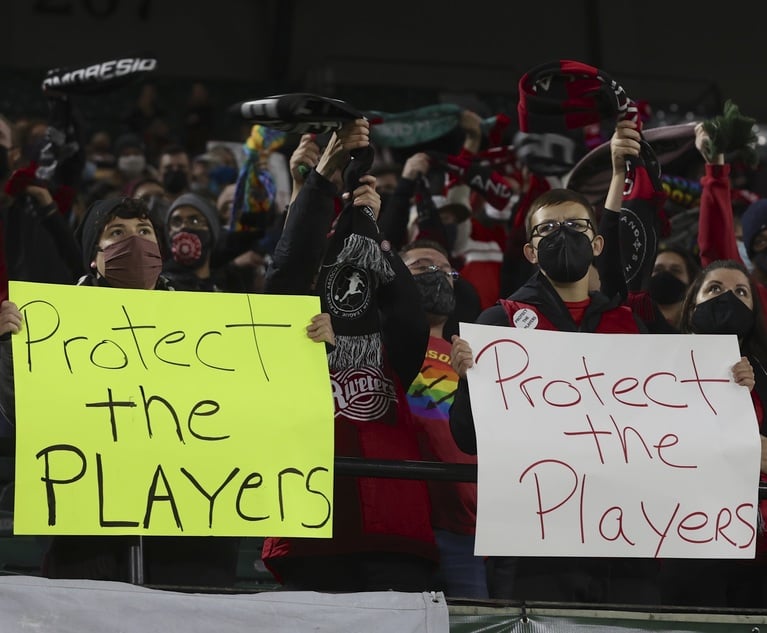Management Agreements Leave a Good Deal to Be Negotiated
In their Entertainment Law column, Michael I. Rudell and Neil J. Rosini look at the contractual relationship between an artist and a personal manager, who provides advice and guidance in creative matters.
June 02, 2017 at 02:03 PM
8 minute read
At some point during his career, an entertainment attorney may be asked to negotiate a management agreement on behalf of the manager or the artist, such as an actor or musical performer. These agreements are important because they not only cover how significant sums of revenue will be shared, but also establish the basis of what often turns out to be a very personal relationship.
There are different types of managers. Some are business managers who handle the financial and commercial affairs of the client. Others are personal managers who provide advice and guidance in creative matters, such as helping a rock band with its live act or reviewing projects under consideration by an actress. Some managers do both. This article will focus primarily on the contractual relationship between a personal manager and an artist.
As with most negotiations, compromises depend on the relative bargaining power of the parties. When the manager becomes involved with an artist who is at the beginning of her career, the manager is keenly aware that relatively more managerial time and effort will be required per dollar earned. This makes the manager less amenable to accepting a deal that deviates from the form agreement it customarily proffers. If the artist already has achieved a level of success that generates substantial revenues, then the leverage may shift in her direction.
Key Agreement Terms
The key provisions of the agreement are the particular services to be provided by the manager, including the industry sectors that both management and artist agree will be the focus; the territory; exclusivity; the revenues on which the manager's compensation will be calculated; the duration of the manager's services; and the duration of the manager's compensation, which usually lasts beyond the term.
This content has been archived. It is available through our partners, LexisNexis® and Bloomberg Law.
To view this content, please continue to their sites.
Not a Lexis Subscriber?
Subscribe Now
Not a Bloomberg Law Subscriber?
Subscribe Now
NOT FOR REPRINT
© 2025 ALM Global, LLC, All Rights Reserved. Request academic re-use from www.copyright.com. All other uses, submit a request to [email protected]. For more information visit Asset & Logo Licensing.
You Might Like
View All
National Women's Soccer League Reaches $5M Deal to End Sex Abuse Case
3 minute read
Spotify GC Steps Down, Opts to 'Step Away From Full-Time Corporate Life'
2 minute read
The Met Hires GC of Elite University as Next Legal Chief

Trending Stories
Who Got The Work
J. Brugh Lower of Gibbons has entered an appearance for industrial equipment supplier Devco Corporation in a pending trademark infringement lawsuit. The suit, accusing the defendant of selling knock-off Graco products, was filed Dec. 18 in New Jersey District Court by Rivkin Radler on behalf of Graco Inc. and Graco Minnesota. The case, assigned to U.S. District Judge Zahid N. Quraishi, is 3:24-cv-11294, Graco Inc. et al v. Devco Corporation.
Who Got The Work
Rebecca Maller-Stein and Kent A. Yalowitz of Arnold & Porter Kaye Scholer have entered their appearances for Hanaco Venture Capital and its executives, Lior Prosor and David Frankel, in a pending securities lawsuit. The action, filed on Dec. 24 in New York Southern District Court by Zell, Aron & Co. on behalf of Goldeneye Advisors, accuses the defendants of negligently and fraudulently managing the plaintiff's $1 million investment. The case, assigned to U.S. District Judge Vernon S. Broderick, is 1:24-cv-09918, Goldeneye Advisors, LLC v. Hanaco Venture Capital, Ltd. et al.
Who Got The Work
Attorneys from A&O Shearman has stepped in as defense counsel for Toronto-Dominion Bank and other defendants in a pending securities class action. The suit, filed Dec. 11 in New York Southern District Court by Bleichmar Fonti & Auld, accuses the defendants of concealing the bank's 'pervasive' deficiencies in regards to its compliance with the Bank Secrecy Act and the quality of its anti-money laundering controls. The case, assigned to U.S. District Judge Arun Subramanian, is 1:24-cv-09445, Gonzalez v. The Toronto-Dominion Bank et al.
Who Got The Work
Crown Castle International, a Pennsylvania company providing shared communications infrastructure, has turned to Luke D. Wolf of Gordon Rees Scully Mansukhani to fend off a pending breach-of-contract lawsuit. The court action, filed Nov. 25 in Michigan Eastern District Court by Hooper Hathaway PC on behalf of The Town Residences LLC, accuses Crown Castle of failing to transfer approximately $30,000 in utility payments from T-Mobile in breach of a roof-top lease and assignment agreement. The case, assigned to U.S. District Judge Susan K. Declercq, is 2:24-cv-13131, The Town Residences LLC v. T-Mobile US, Inc. et al.
Who Got The Work
Wilfred P. Coronato and Daniel M. Schwartz of McCarter & English have stepped in as defense counsel to Electrolux Home Products Inc. in a pending product liability lawsuit. The court action, filed Nov. 26 in New York Eastern District Court by Poulos Lopiccolo PC and Nagel Rice LLP on behalf of David Stern, alleges that the defendant's refrigerators’ drawers and shelving repeatedly break and fall apart within months after purchase. The case, assigned to U.S. District Judge Joan M. Azrack, is 2:24-cv-08204, Stern v. Electrolux Home Products, Inc.
Featured Firms
Law Offices of Gary Martin Hays & Associates, P.C.
(470) 294-1674
Law Offices of Mark E. Salomone
(857) 444-6468
Smith & Hassler
(713) 739-1250






